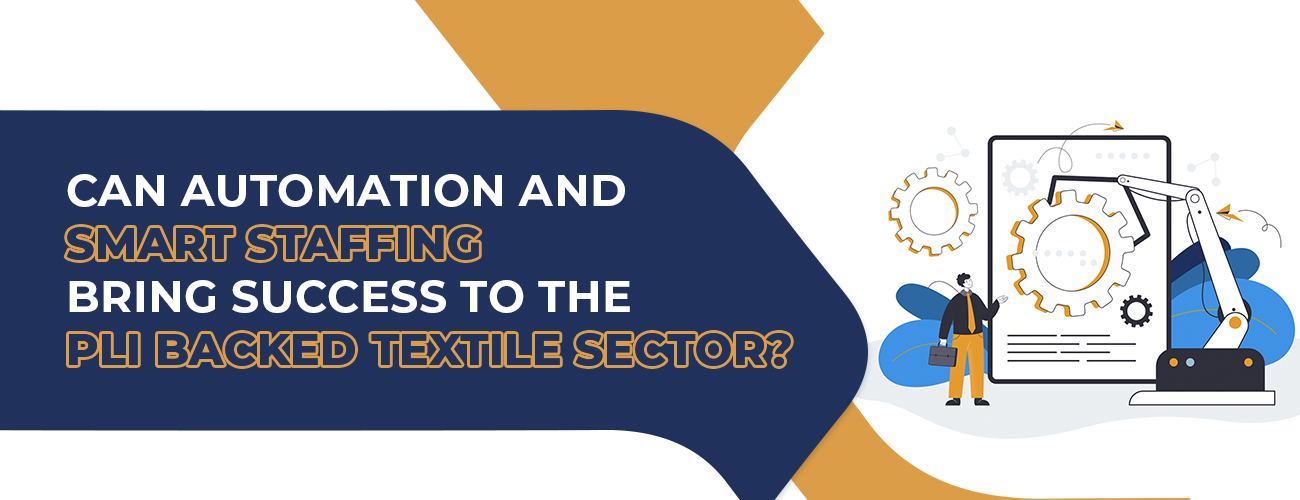Can Automation and Smart Staffing Bring Success to the PLI Backed Textile Sector?

Q1 FY23 brings in new hopes and directions for advancement and growth. It is essential to introspect about staffing solutions and smart hr solutions which can create a better impact. Can Automation and Smart staffing bring success to the PLI backed Textile sector? The answer is a big Yes.
PLI is expected to help in the growth of the businesses drastically and hence the requirement for manpower is going to be at an all-time high along with the automation. Staffing players like TeamLease have a major role to play in this journey in terms of providing skilled labour in a short span.
Identifying the pain-points such as employment concerns including less Jobs, low Wages, high attrition & employability issues due to low productivity, & lack of social security is essential to comprehend. Thereafter, offering of legitimate solutions such as optimization, specialisation, stability, predictability, innovation & skilling can be of a better choice. The difference at large can be observed when the thought leadership levers such as formalisation & human capital development can go ahead hand in hand.
Labour compliances and technology can move up to smoothen the manpower management, and learning opportunities for associates. These are going to be the key evaluators to become a worthy staffing partner to textile companies under the PLI scheme of the Government.
The textile industry in India contributes to about 5% of the GDP whereas it contributes about 7% of industry output, and about 12% of India’s export earnings.
MMF stands for man-made fibres and are of two varieties. The first one focuses on synthetic fibres which are produced from crude oil whereas the second one focuses on cellulosic fibres from the food pulp. Polyester, acrylic and polypropylene are the major varieties of the synthetic staple fibres. To expand and to ambit towards a specific function will bring quantitative and qualitative results, which for the textile industry is worth a focus.
This brings one to comprehend that the processes that can be dangerous to an individual such as spinning and dyeing, moving and making cloth pieces and fibres into fabrics or separation of seeds and cotton can be handled better, safer with the automation processes. With this, the smart workforce models can ensure job completion properly and efficiently.
What are the PLI schemes? Why are these important?
Production Linked Incentive scheme is being implemented by the government of India and aids in the growth and development of the sector. For the textile industry, the current focus is on the MMF productions, exports, PSF (Polyester staple fibre) and VSF (viscose staple fibre).
In India, the PLI scheme can help generate employment while staffing solutions such as TeamLease can help in workforce management.
The scheme encourages domestic and local production to create micro jobs and the motto of putting India to work by TeamLease works with a cause that can align with this. The scheme also encourages for foreign companies to find suitable staffing in India and hiring solutions formalisation can help get better employee management, engagement & DE & I initiatives to be effective.
Along with higher production, smart staffing and workforce management what is also essential is safety and security. With automation, the clause of people, process and technology gets easily and better satisfied. With automation not only will the textile industry produce better and faster, but will aid the human resource of the industry, the employees to be having safer working conditions and increase in efficiency.
Skill level workers could reduce, however high skilled workers, upskilled workers can be engaged for better results and directional outcomes. There might be higher investment however, since the focus of PLI schemes and the need of the hour of the textile industry is to grow higher, in the long term, the investment for automation is definitely worth it.<br?
With the digital upgrade, recruitment, the workforce payroll, real time attendance, software solutions support, automated integration can update and smoothen the way the textile industry works and delivers, which for 2022-2023 is a much needed area to lookout for.
With an aim to develop several globally competitive champions and as a global industry led by MMF in textiles, automation and smart staffing can bring success to the PLI backed Textile Sector.
Latest Blogs
Permanent vs. Contract Staffing: What’s Right for Your Business?
Workforce strategy matters now more than ever in India’s evolving employment landscape. As businesses strive for growth, efficiency, and regulatory compliance, choosing between permanent staffing...
Read MoreApprenticeship Programs vs Internship: Understanding the Difference
As India sharpens its focus on employability, workforce formalization, and industry-aligned skilling, the conversation around apprenticeship programs vs. internship has become increasingly important. For employers,...
Read MoreApprenticeship India: A Guide to NAPS, NATS & Compliance
As India strengthens its workforce strategy, apprenticeship initiatives in India are gaining renewed relevance for employers across sectors. With skill gaps widening and compliance requirements...
Read MoreHow Apprenticeships in India Help Build Job-Ready Talent?
In a fast-evolving job market, businesses across India face a common challenge: finding candidates who are not just qualified on paper but ready to perform...
Read MoreStrategic Workforce Planning in India: Why Smart Talent Strategy is Important?
For years, strategic workforce planning in India was treated as a back-office exercise—something to be revisited when hiring pressure built up or attrition spiked. That...
Read More





